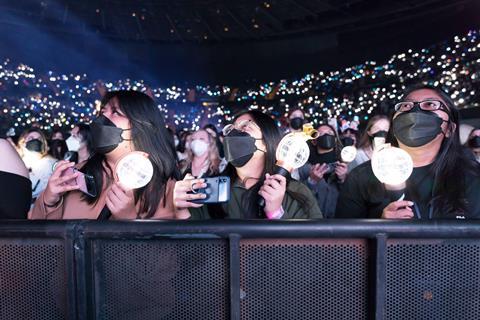Writer Amy Clarke shares how her unexpected love for K-Pop helped her grasp the joy of heavenly worship. Through the beauty of concerts and lightstick oceans, she began to imagine heaven not as tedious, but as a place of shared wonder and delight in something far greater than ourselves.

What is heaven actually like? I was probably about ten when I started asking that question. As a young Christian, I knew about heaven as a concept – the perfect place we go after we die, the place where God is. I knew about how Jesus asked us to focus on having treasures in heaven instead of this world. But, being just a small person at the time, the things in this world felt (and sometimes still do feel) very big. Heaven would have to be a very good place indeed to make up for it! So naturally I had questions.
Why for example, would a place of continual worship feel good instead of tedious?
Why for example, would a place of continual worship feel good instead of tedious? I was also particularly offended by the verse about how we would cast our crowns at Jesus’s feet. The whole point of getting a crown, in my ten-year-old opinion, was to keep it. But even once I had learned the theology, I still felt like it didn’t make sense. It was only in my early twenties that I found the answers my heart wanted. I stumbled across them in fact, while pursuing my new lockdown-induced obsession with K-Pop.
I stumbled across them in fact, while pursuing my new lockdown-induced obsession with K-Pop.
READ MORE: Does the rise of Korean culture in the global stage direct us to a move of God?
As with many other so called “international fans” of K-Pop, everything was new to me. At the start I couldn’t even tell different people’s faces apart. Korean and the unique K-Pop fandom culture blurred together in a vibrant whirl of music, performances, variety shows produced by the bands themselves, and a continuous quest to find subtitles. Often it was the bilingual fans who came to my rescue, uploading free translations of official content. It was surprisingly wholesome watching the perfectly polished performers goof off for the camera, only to turn around and electrify me with their stage performances. Also striking was how close and real the relationship between performers and fans felt; their gratitude was passed on to fandoms by name.
READ MORE: Women in South Korea are faced with having a job or having children
So there I was, getting up in the small hours of the morning (thank you seven-hour time difference between South Africa and South Korea) to watch recorded K-Pop concerts being streamed for fans in lockdown. I thought about how amazing it would be to be there in person; part of the cheering crowd united by shared delight. Then the answer to my heaven question suddenly dropped into my heart. The reason concerts feel so good is because they satisfy a deep desire that I think all humans have, to look to something bigger than themselves. Concerts are gloriously outwards focused. It doesn’t matter that I can’t sing in Korean. I am there for those who can, and there is freedom in that. Suddenly, the idea of heaven being a place of worship made perfect sense. If cheering for an earthly band from my couch feels so good – how much more will it feel when the Main Act begins?
READ MORE: Why South Korean women are striving for a male-less existence. And why I sort of get it.
With this paradigm shift in mind, my “casting crowns” problem was resolved by a striking aspect of K-Pop concert culture. At a regular concert, you might wave a phone torch to support the artist on stage. In K-Pop, each group has a unique lightstick for the job. These lightsticks sync up to the concert and flash colours and patterns according to the song is playing. Held aloft in the hands of the fans in the audience, these lightsicks create what is referred to as an “ocean” for the band to see. This ocean of support can be deeply moving to witness, sometimes bringing the band to tears as they perform their final set. The flip side of concerts being outwards focused for the audience, is that they are also outwards focused for the band pouring their hearts out on stage. Lightsticks therefore, become a way for fans to participate, creating something beautiful to give back to the artists on stage.
As I watched the end of my online concert, and the lyrics of BTS’s Mikrokosmos declared “You’ve got me… I’ve got you…”, and I found myself longing to be there holding up my own light in the ocean – the point of having a crown just to cast it at God’s feet became clear. At long last my heart felt that it understood what heaven would be like.

































No comments yet